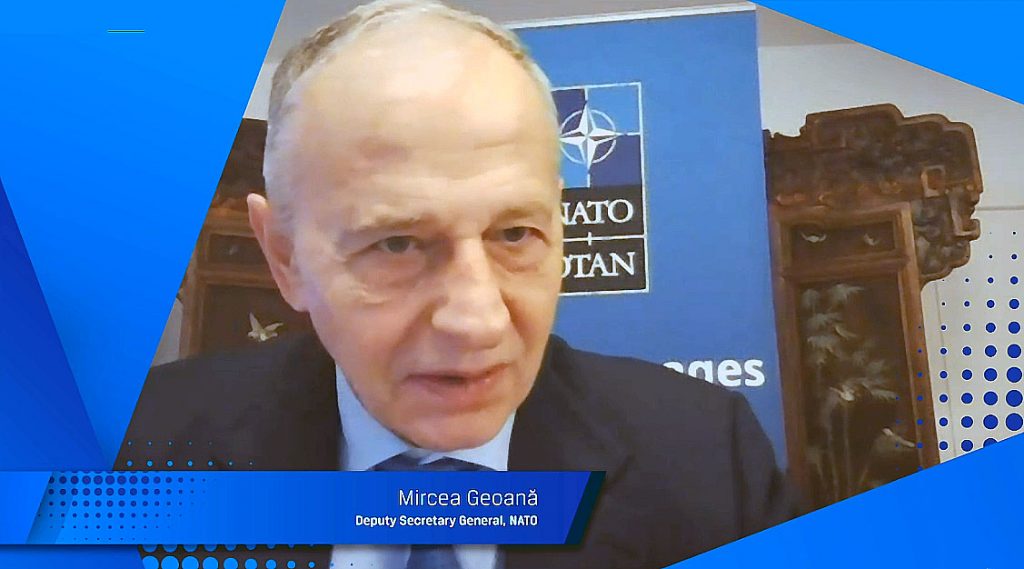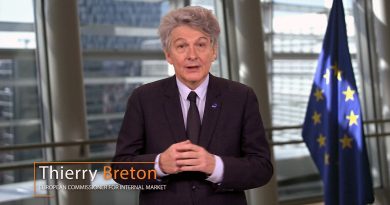
Keynote Speech – Mircea Geoană, Deputy Secretary General, NATO
In his keynote speech the NATO Deputy Secretary General, Mr. Mircea Geoană first underlined how the topic of the conference was of great importance to Europe and the European security, as well as for NATO, because European defence is inextricably linked to transatlantic defence. “We should never forget that what really bonds our two organisation are our common values, and I think this is another incentive to further strengthen our strategic partnership,” he stated adding that, “In recent years, NATO-EU cooperation has reached unprecedented levels. We are working together on so many issues, from improving military mobility, countering hybrid and cyber threats, countering disinformation together, we have done this during the pandemic very successfully, to coordinating our exercises or improving our strategic communications”, he said. The pandemic further accelerated that cooperation, not only against disinformation by countering propaganda, but also resilience has become one of the topics that the two organisations are considering together; “Over the last five years NATO has developed an important base of requirements for resilience, and we welcome the fact that the European Union is also looking into this, and together we can have a comprehensive approach to resilience which is becoming one of the lessons learned of this pandemic.”
“We are also working hand in hand to develop the right and the best defence capabilities, and we have achieved result. I listened to the High Representative Josep Borrell mentioning air-to-air refuelling capabilities in Europe, and this is one of the very specific projects we have done together, the EDA, the Organisation for Joint Armaments Cooperation (OCCAR) and the NATO Support and Procurement Agency (NSPA),” Mr. Geoană said. He underlined that it took eight years since the start of the project to get the first three aircraft delivered, a positive example that should serve as a guide according to NATO DSG words. “The remaining six aircraft of this fleet will be delivered by the end of 2024, with an option for two additional aircraft in the future, and Luxembourg recent addition of 1,000 flight hours to its MRTT commitment made the firm acquisition of a sixth aircraft possible.” He also stresses other interesting examples of defence, technological and industrial cooperation between NATO and the EU.
Shifting to the issue of threat perception, which triggers national responses for both NATO and the EU, Mr. Geoană underlined the importance of comparing the threats perceived by the two organisations, making sure that there is a more homogeneous understanding of the threat that Europe is facing in this new era of global competition. .
One of the areas where both organisations have developed consistent tools is cyber, NATO having declared it an operational domain five years ago. “This goes beyond traditional defence and deterrence, and this is where we are and we should work even closer together,” Mr. Geoană said.
Coming to emerging technologies, NATO is already delivering on the Emerging and Disruptive Technology Implementation Roadmap. “I think we can do, and should do, more when it comes to new technologies and the way in which these are affecting not only defence and security, but also the way of life. Because the definition of security is becoming far more multifaceted. The line between traditional threats and non-traditional threats is becoming more blurred”, he said. “Artificial Intelligence, Quantum Computing, Biotechnology, are all topics that are in turbulent transformation and that are impacting on our security. We have to work and do things together,” he added, underlining that Autonomous Systems are already here. The last operational domain that NATO declared during the 2019 London Summit is space. “Recently NATO has established in Ramstein, Germany, a Space Subcommand for military operations, and we are establishing in Toulouse, France, a Space Centre of Excellence, while the EU has a Space Agency. So I think we can do things together.”
The NATO DSG underlines how the global competition is intensifying, citing the rise of China, the way in which Russia is looking at things, the fact that terrorism is far from disappearing, also mentioning the threats inherent with the advent of great powers competition, technology, and the attitude of some non-state actors. Some issues are not necessarily linked to the military world, but can have a disruptive impact on the Western world, in example that on the 5G, for which Mr. Geoană praises the work done by Thierry Breton, the Commissioner for Internal Market at the European Commission, which he deems complementary to what NATO has done on that same subject. “We must not fool ourselves, China is becoming a dominant global player, and we have to coordinate the way in which our two organisations are looking at it,” he declares, of course each organisation keeping its specificities, due to the differences in their mandates.
Speaking of Russia, “They have developed, and are developing as we speak, super-advanced missile systems that are posing a threat to us, to all of us, and mainly to the European territory, and that is something that we have to work together,” he said adding that it is not a subject that can be taken lightly.
Beside the two main global players, other risks face Europe and NATO in the future: alongside terrorism we must consider nuclear proliferation, climate disruptions and potentially other kinds of pandemics, and must cope with them, “We must be sure we put all our instruments together, separate when there is no need, but together when there is a necessity, because this is how we are stronger,” Mr. Geoană underlined.
Remaining on the wider landscape, the NATO DSG faced the transatlantic relationship issue, mentioning the new US Administration and the approach that both the EU and NATO are having, announcing his hope to have a NATO Summit in early 2021.
All in all, “I think this moment is one that should encourage us to do an even better job together and realign, re-synchronise each one, maintaining the specificities that should be reflected and respected in how we bring security to Europe, and how we can face the global competition in the 21st Century,” Mr. Geoană said.
The NATO DSG appreciated that the EU is becoming more ambitious on defence and security; “It is not only burden-sharing in terms of the mathematics we want about defence spending, it is also about the quality of the investment in our defence. We are still very vulnerable, and the way in which international security is developing is putting our societies, our national interests and our organisations under tremendous stress. And this is where we have to do much more together. It is also shifting the balance.” He noted that today 80% of defence spending in NATO comes from outside the EU countries, and that 90% of the population of the EU is also the population of NATO countries. “So we are, in a way, obliged to work together”, he said, adding, “And if there is an evolution like NATO 2030, a potential revisiting of our strategic concept in the next period of time, we have to make sure we work together and we keep the synergies in place. I am a great proponent of the strategic partnership between NATO and the EU, and I think that if there will be high level meetings next year we have to think how we can really inject a new generation of fresh ideas in what to do together, because as we enter in this very turbulent period of human history we need each other more than ever, we need to do more, we need to do better, and we have to make sure we keep the integrity of our values and our interests intact in a period which is complicated,” Mr. Geoană concluded.



